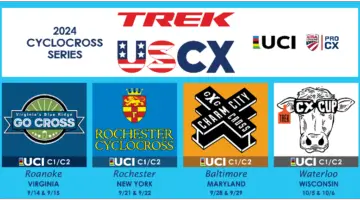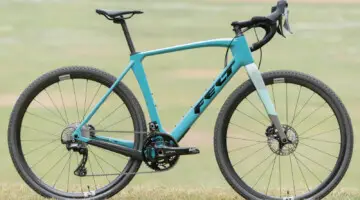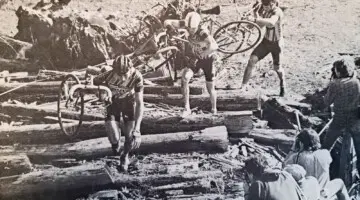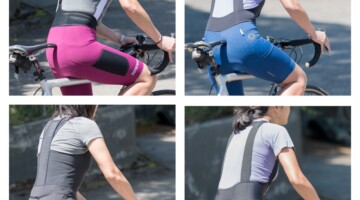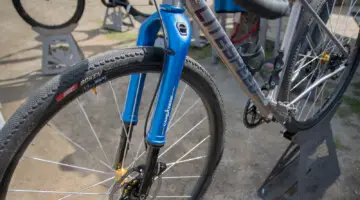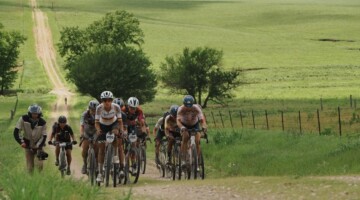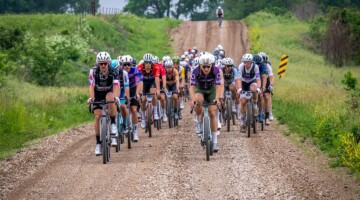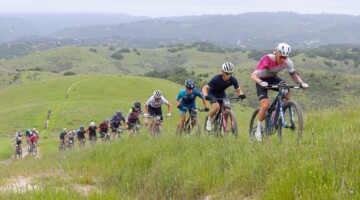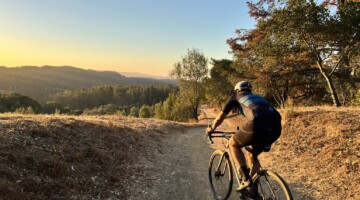“Self-supported” in gravel racing means something different at every race. In races like the DKXL, it literally means you are on your own, carrying what you can at the start and then stopping at gas stations along the way. At others, events will provide rest stops but not allow outside help along the course.
At the Dirty Kanza 200, you are allowed to bring a team to support you, but you are only allowed to get help from them at designated checkpoints—or for a ride back to Emporia if you have to drop out. At the 2019 DK200, there were just two checkpoints, one in Alma and one in Council Grove, meaning riders would be on their own for longer stretches than in past years.
Moving through checkpoints effectively probably will not make or break your DK200 race, but a slow stop to refuel, fix your bike and maybe rest for a spell could mean having to burn another match or two if the riders in the group you came in with are quicker out of town. Forget something and it may take its toll 50 miles down the road.
After covering the 2018 Dirty Kanza, I wrote about how amazed I was by the spectacle of the Dirty Kanza 200 checkpoints. With upwards of 1,000 riders starting the 200-mile race, there are a lot of supportive family and friends gathered in a small area looking to help their riders out.
When I put together that photo essay, I wrote, “In retrospect, I wish I had delved into the story of the pit crews more. If I return to Kanza in 2019, you can count on a trip into the pit being part of our coverage.”
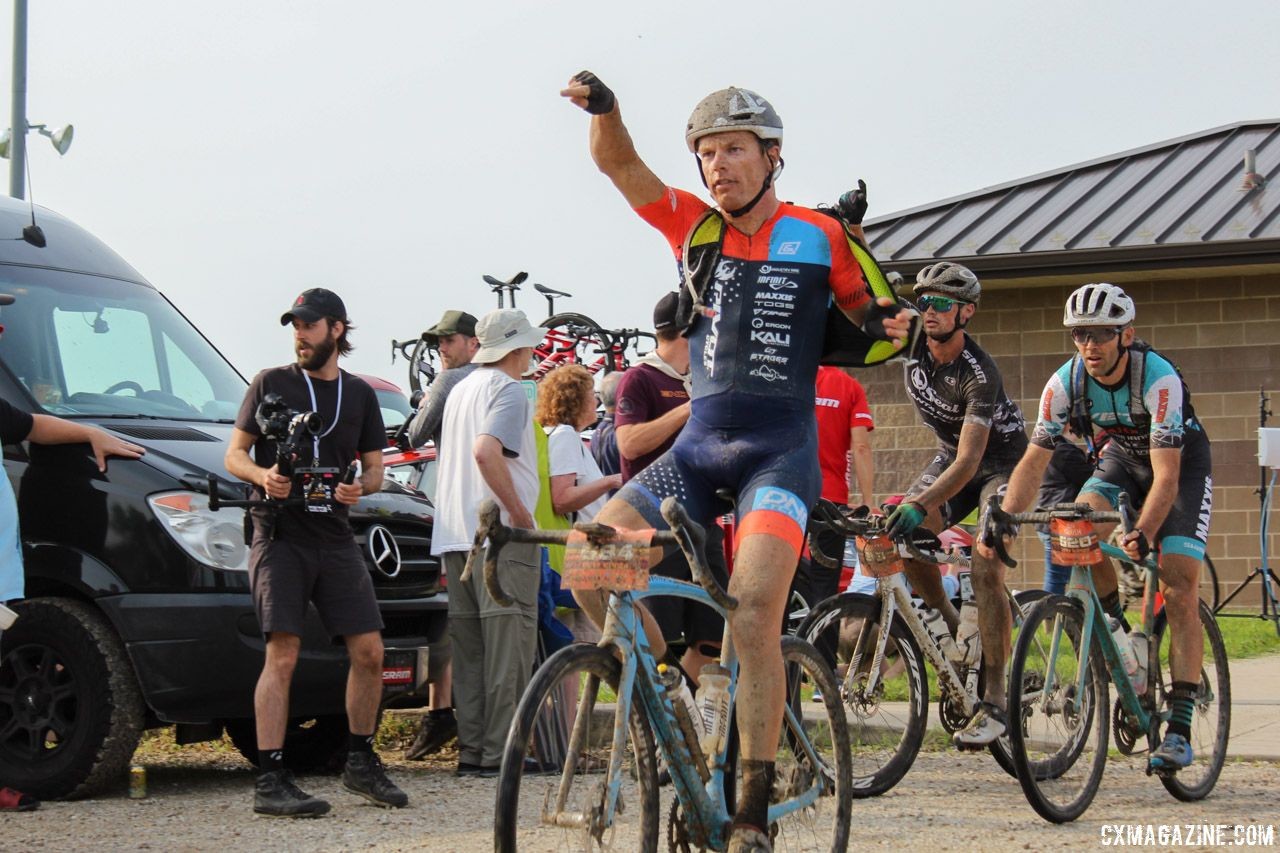
The author was impressed by the spectacle of the checkpoints at last year’s DK200. 2018 Dirty Kanza 200. © Z. Schuster / Cyclocross Magazine
Mission in hand, I needed a pit crew to check in with.
One group that knows a thing or two about the Dirty Kanza 200 checkpoints is the now Panaracer / Factor p/b Bicycle X-Change gravel team founded by Bob Cummings. The group has grown from just Cummings to 9 riders in 2019 and has plenty of experience dialing in its DK200 Checkpoint Shuffle.
In charge of the operation since the start has been Bob’s wife Becky. I chatted with her before the first riders rolled into Alma and peaked around the edges as the team got riders into and out of Checkpoint 1 and back on their respective ways.
“This is year six. It started with just one rider and now we’re up to nine,” Becky Cummings said. “Every year it jumps and jumps. This year will be the most. Every year you kind of have to up your game to make sure everyone can find their stuff. It’s not easy.”
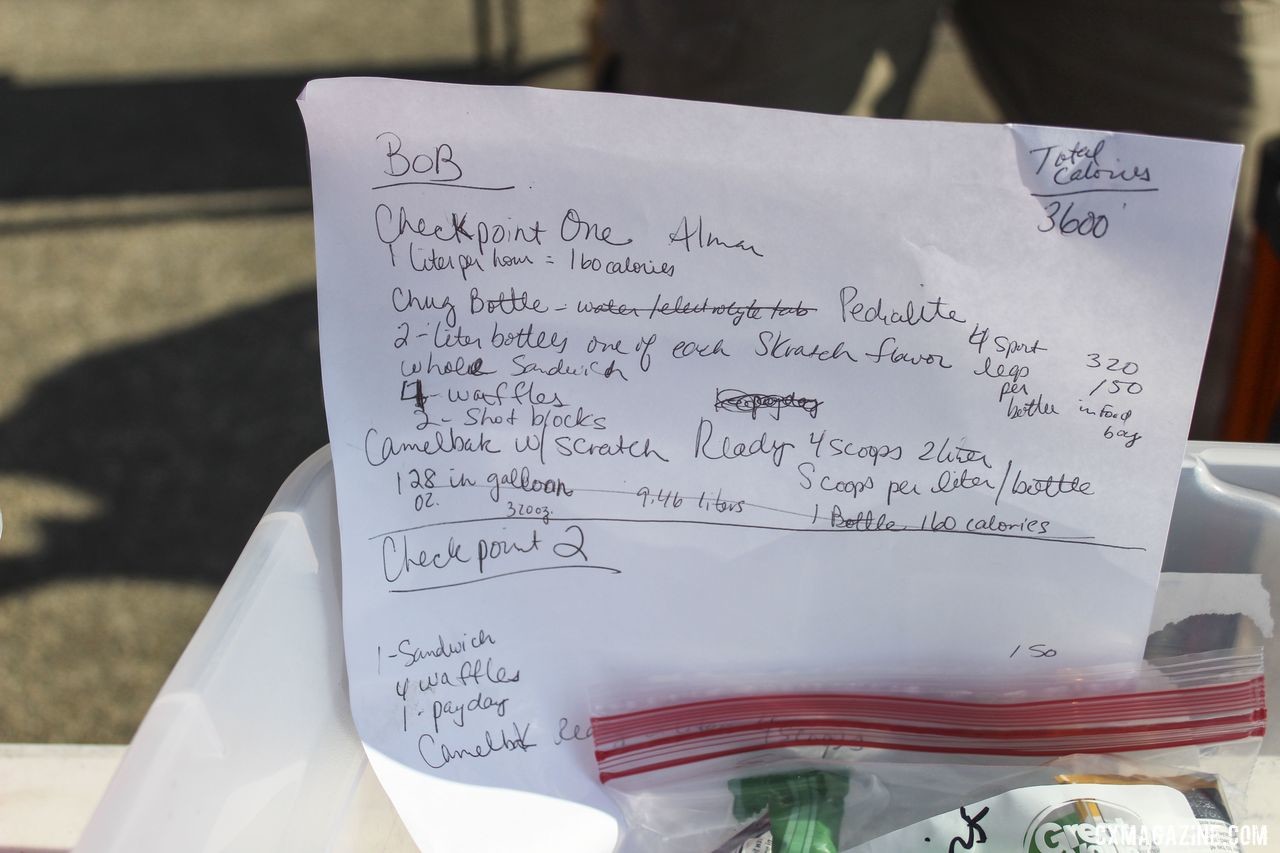
Detailed instructions helped riders make sure they got their calories and water. 2019 Dirty Kanza 200, Panaracer / Factor p/b Bicycle X-Change Checkpoint 1. © Z. Schuster / Cyclocross Magazine
The Ready, Set
Checkpoint crews take all shapes and sizes at the Dirty Kanza 200. The Panaracer / Factor team sits at one end of the spectrum with strength in numbers and the steady leadership of Becky Cummings and her years of experience.
Getting one person to Emporia for a weekend can be expensive, so at the other end of the spectrum is the Crew for Hire that charges around $100 to be your checkpoint team for the day. Race diarist Mark Symns and even some Elite riders—consider this pre-hyping a coming interview with Olivia Dillon—opted to go the Crew for Hire route.
In between, there are riders with one person helping them out—we saw Kaitie Keough’s dad help her out in 2018—and riders with small teams that can resemble a NASCAR pit crew at times, taking care of nutrition, hydration and mechanics at the same time.
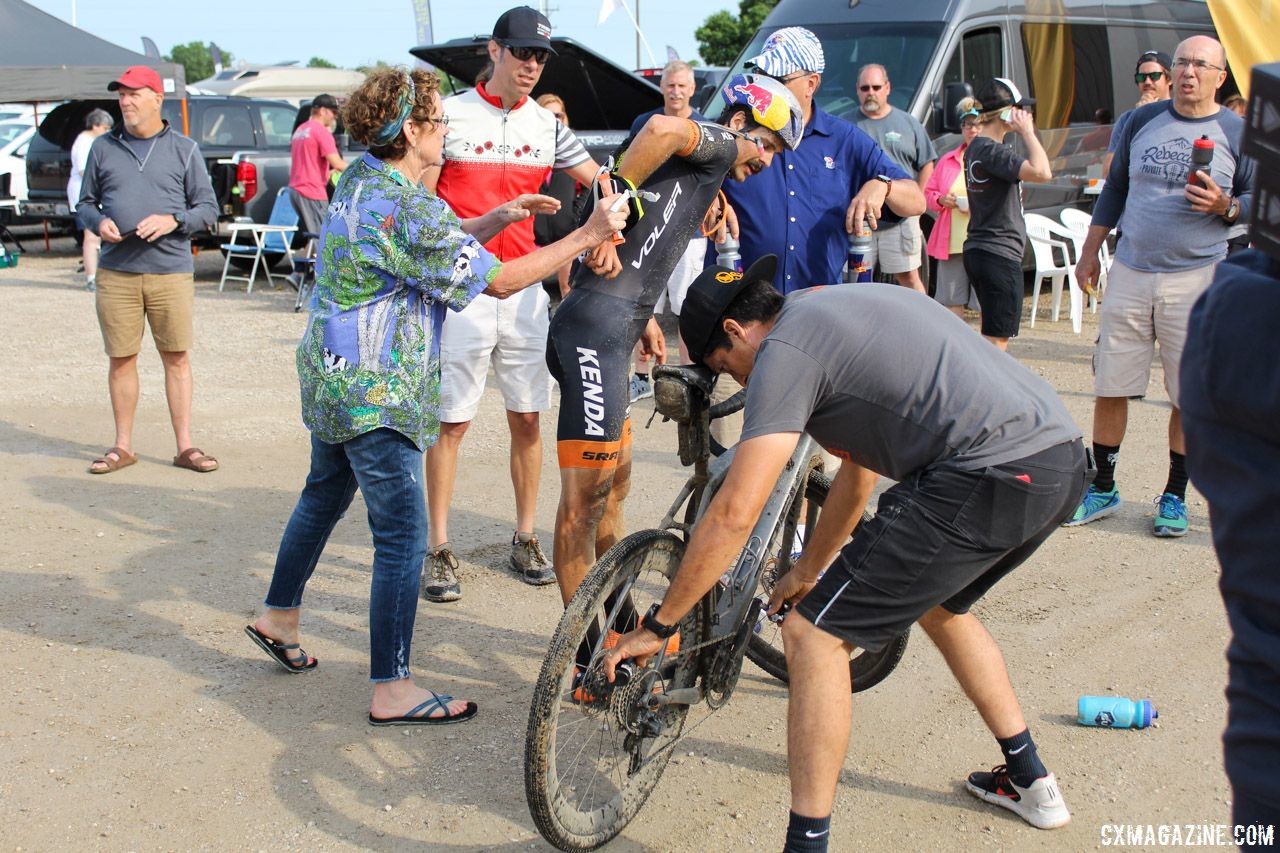
Pit crews can resemble NASCAR teams at times. 2018 Dirty Kanza 200. © Z. Schuster / Cyclocross Magazine
One could argue that the experience of the Panaracer / Factor team is not your typical DK rider’s checkpoint experience—that is probably a fair argument—but the team has years of experience and with nine riders at this year’s race, the support riders received spans the gamut of what you might see from different smaller operations.
The 2018 Checkpoint 1 proved to be pretty chaotic. It was set in the parking lot of a high school at Mile 50, so a massive lead group came into a cramped area at the same time.
This year’s first checkpoint was near Mile 65, and it was spread out over several city blocks in the town of Alma. The groups were smaller and the space was larger, making for a little less chaos at the first stop.
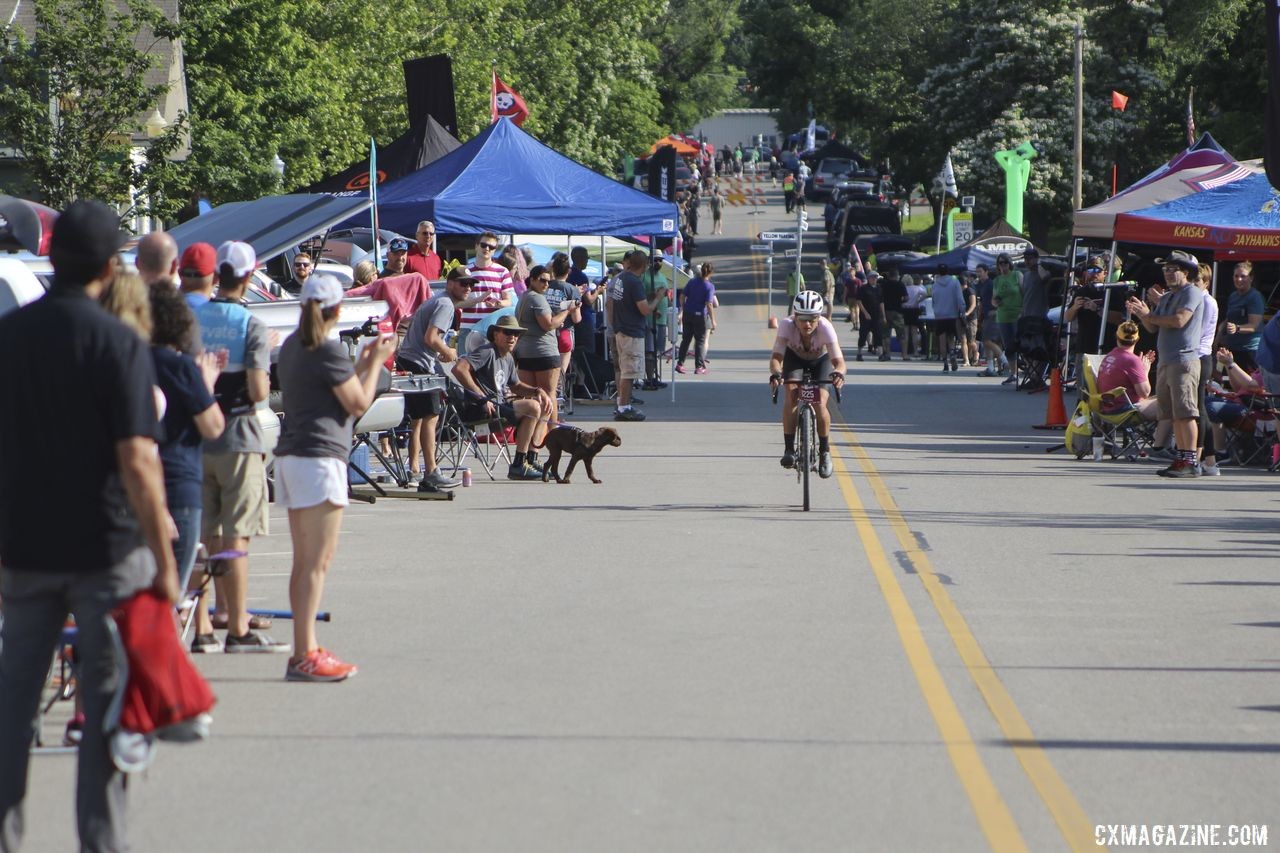
Christian Meier rolls down Mission Street, the longest stretch available for pit crews. 2019 Dirty Kanza 200, Panaracer / Factor p/b Bicycle X-Change Checkpoint 1. © Z. Schuster / Cyclocross Magazine
As you can imagine, nearly a thousand cars rolling up on small Kansas towns can create a traffic snarl. To alleviate complications, riders’ crews are assigned parking spots based on a color-coded system. The system seems to work well, and in my experience, there has been plenty of parking a few blocks farther out in both the towns and Emporia for curious onlookers like myself.
Still, Cummings leaves little to chance when it comes to making sure her riders find their team. When I spoke with her on Friday, she showed me a map of Alma with a spot clearly marked out. “Here’s where you will find us. Right near the exit,” she said.
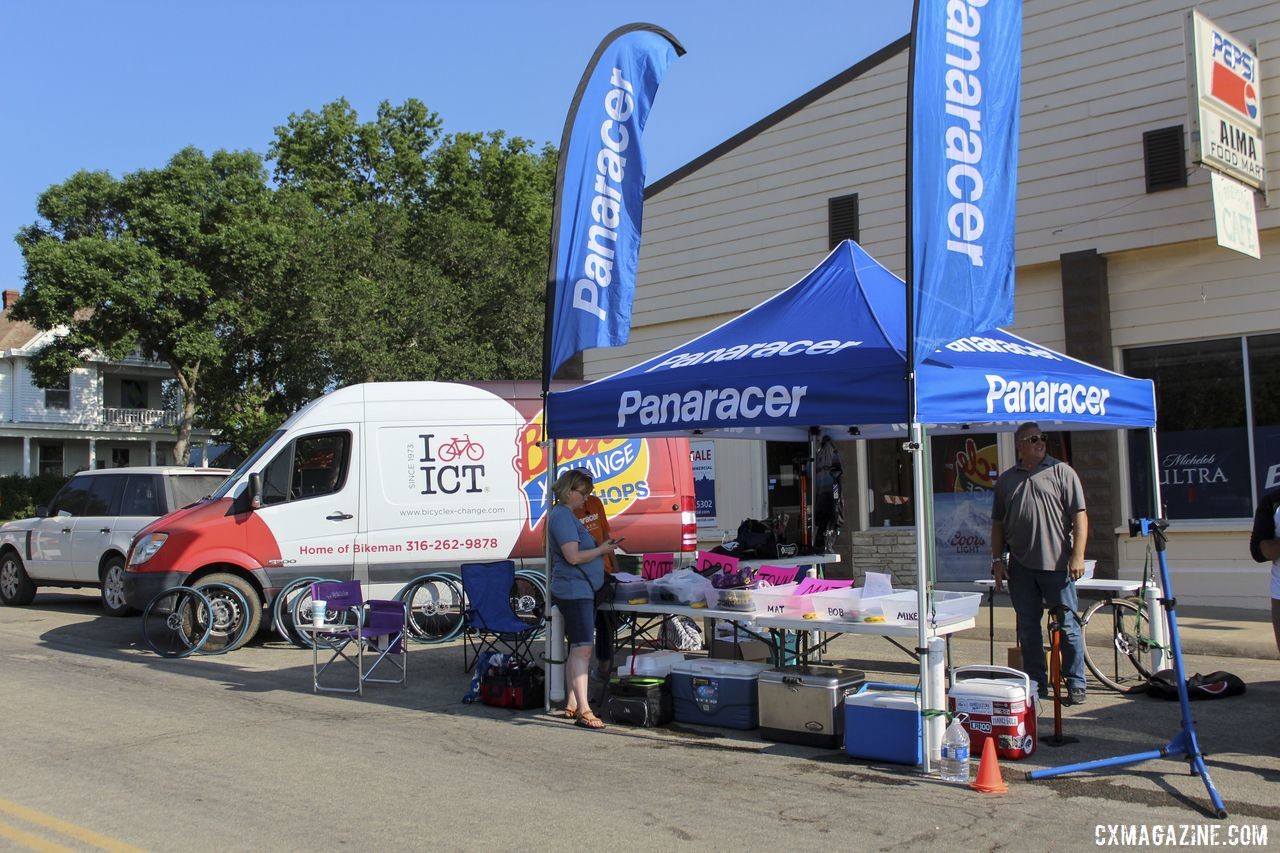
Pop-up tent, van, flags, it was all ready to go early Saturday morning. 2019 Dirty Kanza 200, Panaracer / Factor p/b Bicycle X-Change Checkpoint 1. © Z. Schuster / Cyclocross Magazine
If the chaos and/or delirium set in, riders have clear instructions. “We always tell our people we’ll be on the course. When in doubt, just keep going along the route,” Cummings explained. “Sometimes they’ll second guess it, but just keep going and no matter what, we’ll be on the course. We have our tent and the big flags.”
This year’s course went south through Alma along Mission Street before hanging a right onto W 3rd Avenue and going up a small hill back onto the course. As promised, the Panaracer team was set up at the exit on the right side of W 3rd Avenue with the blue tent and Bicycle X-Change van locking it down and flags a-waving.
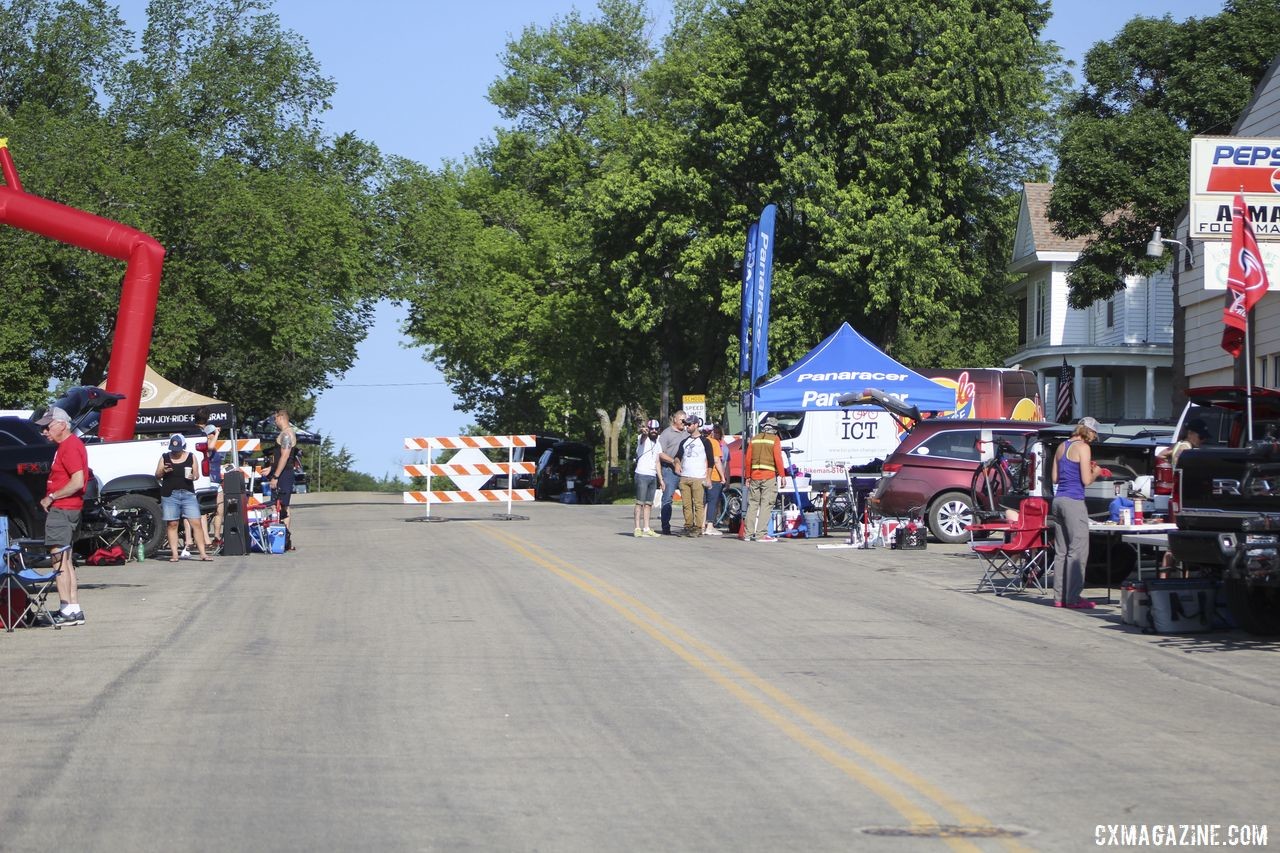
At the exit as promised, the Panaracer tent was relatively easy to find. 2019 Dirty Kanza 200, Panaracer / Factor p/b Bicycle X-Change Checkpoint 1. © Z. Schuster / Cyclocross Magazine
I found the team tent with no problem, arriving about 30 minutes before Christian Meier came rolling through on his ill-fated early attack. I was pepped up on coffee and some early morning snacks, so more or less in the same condition as the riders who had already ridden 65 miles by that point.
The Panaracer / Factor team was in Alma long before my arrival, and their setup was impressive. I noticed it last year, but to help keep things straight, but each rider gets a box to put their checkpoint gear in. “They bring me everything they think they’re going to need. If there’s any confusion, and there’s always confusion, they can go to their box,” Cummings said, adding, “No matter how prepared you think you are, there’s always confusion out there.”
With nine riders, the team has to do a little guessing about who will come into the checkpoint first. At this year’s DK200, the boxes of Scott Moninger, John Borstelmann, Mat Stephens and Bob Cummings were among those set out first.
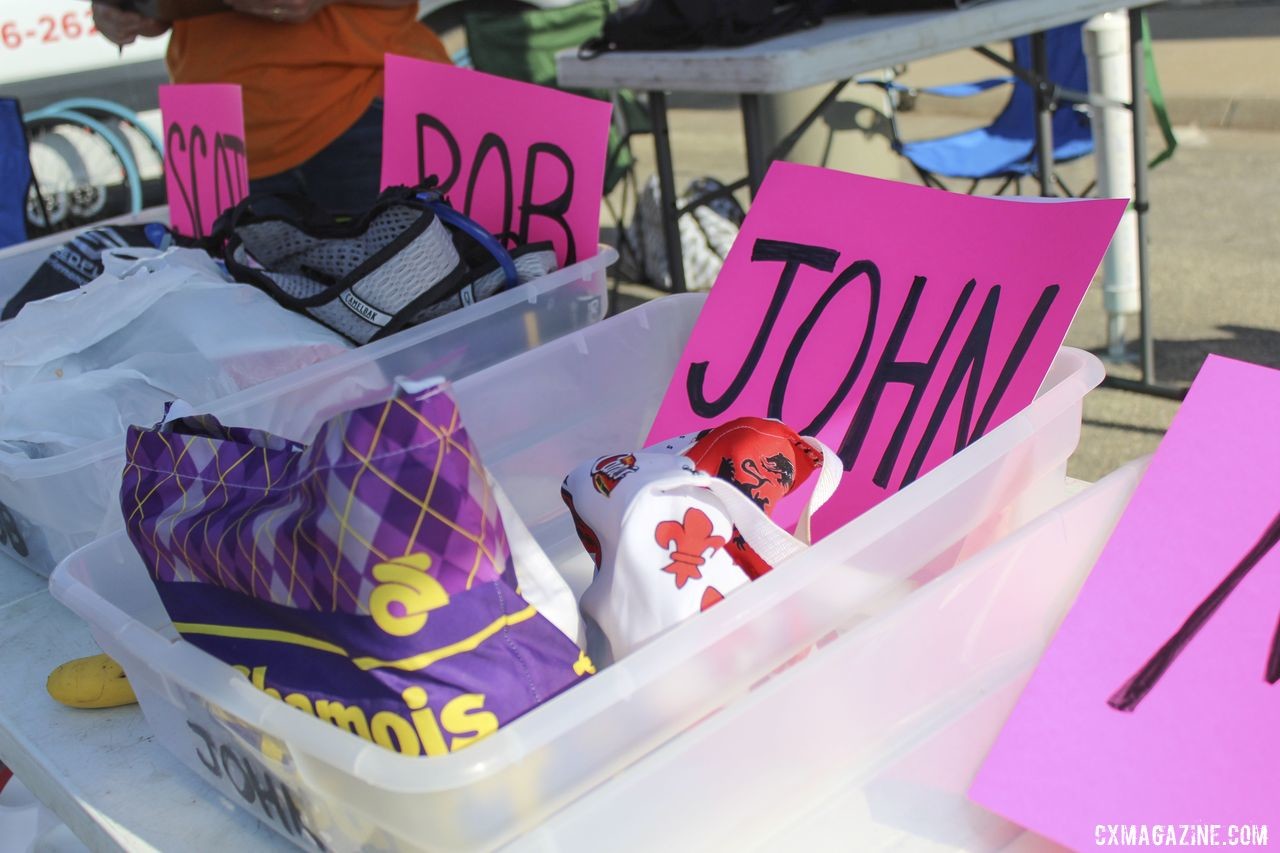
Each rider had a box to hold their food, water and other needs. 2019 Dirty Kanza 200, Panaracer / Factor p/b Bicycle X-Change Checkpoint 1. © Z. Schuster / Cyclocross Magazine
Of course, chaos is part of the game at the DK200, and as promised by Jim Cummins in our race preview, the gnarly stretch of road from Miles 25 to 30 took its toll, giving team riders, among many others, early flats. Replacement wheels were placed next to the team van with care, ready to swap one in if any flats are beyond repair.
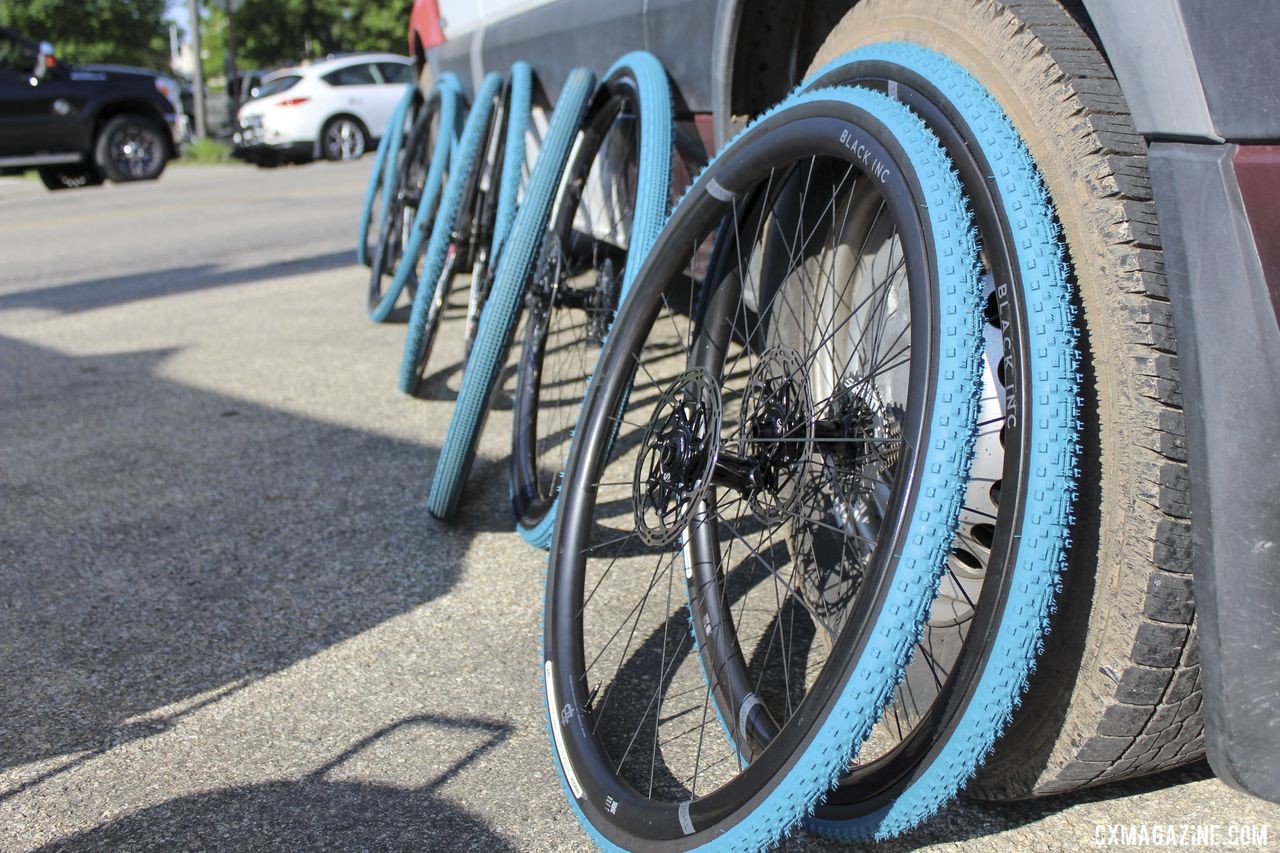
Spare wheels were hung by the van with care. 2019 Dirty Kanza 200, Panaracer / Factor p/b Bicycle X-Change Checkpoint 1. © Z. Schuster / Cyclocross Magazine
Mat Stephens was among the riders who had to chase after an early flat.
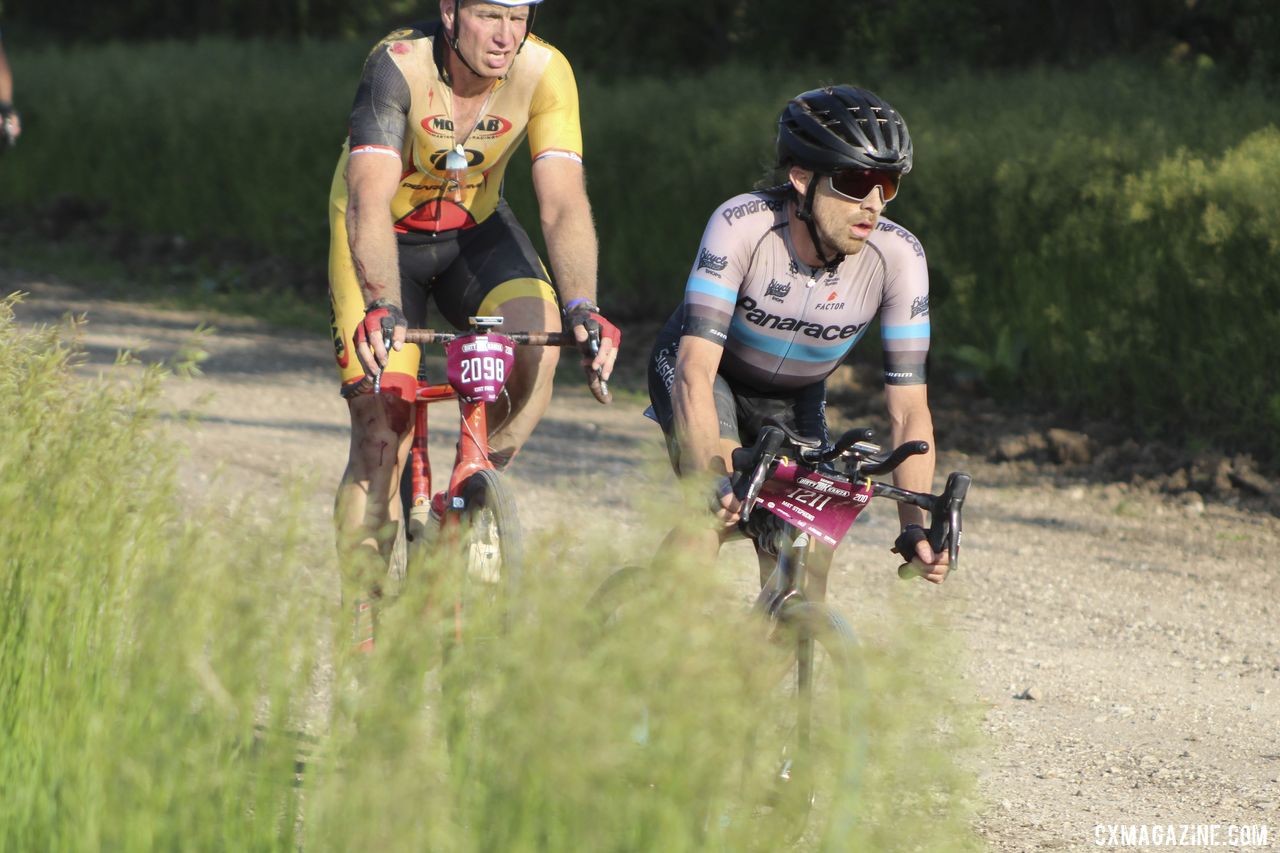
Mat Stephens was among the riders who had to chase after an early flat. 2019 Dirty Kanza 200, Panaracer / Factor p/b Bicycle X-Change Checkpoint 1. © Z. Schuster / Cyclocross Magazine
The Checkpoint Shuffle
With everything set, when 9 a.m. rolled around, it was near go time for the team at the day’s first checkpoint.
While some crews have two or even three people helping one rider, the Panaracer / Factor team likes to try to keep it at one crew member per rider. “It’s easier, I think, just to have one person, especially when they’re just flying through,” Cummings said. “Otherwise we’d have like 15 people. I can see where having two or three people for a rider would work for a small team, but for us, it would be too much clutter.”
This year’s pit team had seven members, with Cummings, Phil Voegell, Carney Marchand, Matt Mason, Dan Szokarski, Jane Sencenbaugh and Jes Shabatura helping out riders John Borstelmann, Mat Stephens, Michael Senecenbaugh, Kae Takeshita, Rob Bell, Karen Pritchard, Mike Marchand, Bob Cummings and Scott Moninger.
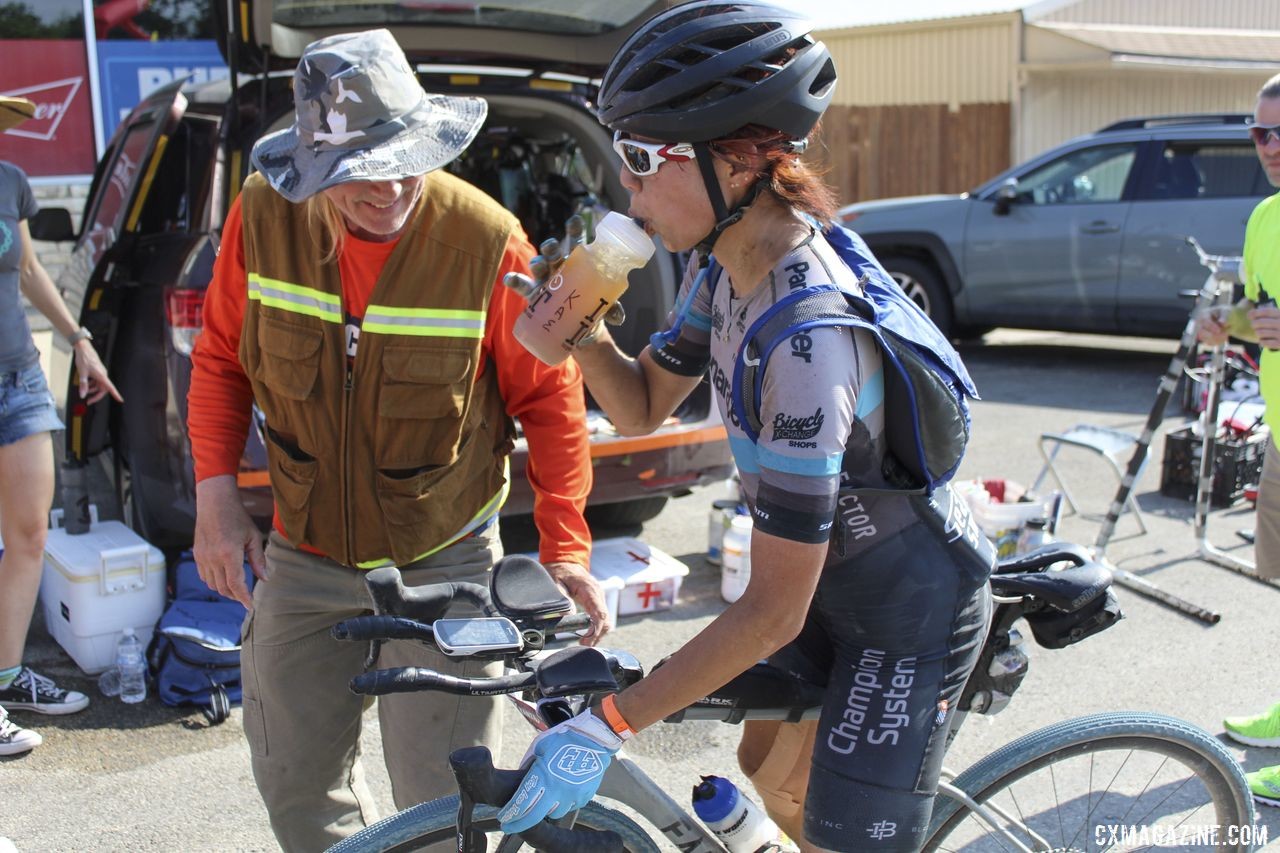
Dan Szokarski was prepared to help his wife Kae Takeshita on Saturday. 2019 Dirty Kanza 200, Panaracer / Factor p/b Bicycle X-Change Checkpoint 1. © Z. Schuster / Cyclocross Magazine
Despite being a team, the following 30 minutes made it clear that each rider has their own approach to handling the checkpoints. Some opted for a full stop, while others grabbed feed bags just as a road racer would. Cummings said that those grabbing bags are, however, much more likely to do a full stop at the second checkpoint when the miles and brutal Kanza sun have taken their toll.
Cummings indicated the team is always trying to improve the smoothness of its checkpoint exchanges, and this year, the team made bright pink signs to aid riders in finding their respective crew people. “Our main lead guys we’re hoping all four come in at once. The idea is to have one person for each of those guys. There will be extras, but we have four people holding signs for them and holding their stuff,” Cummings said on race eve.
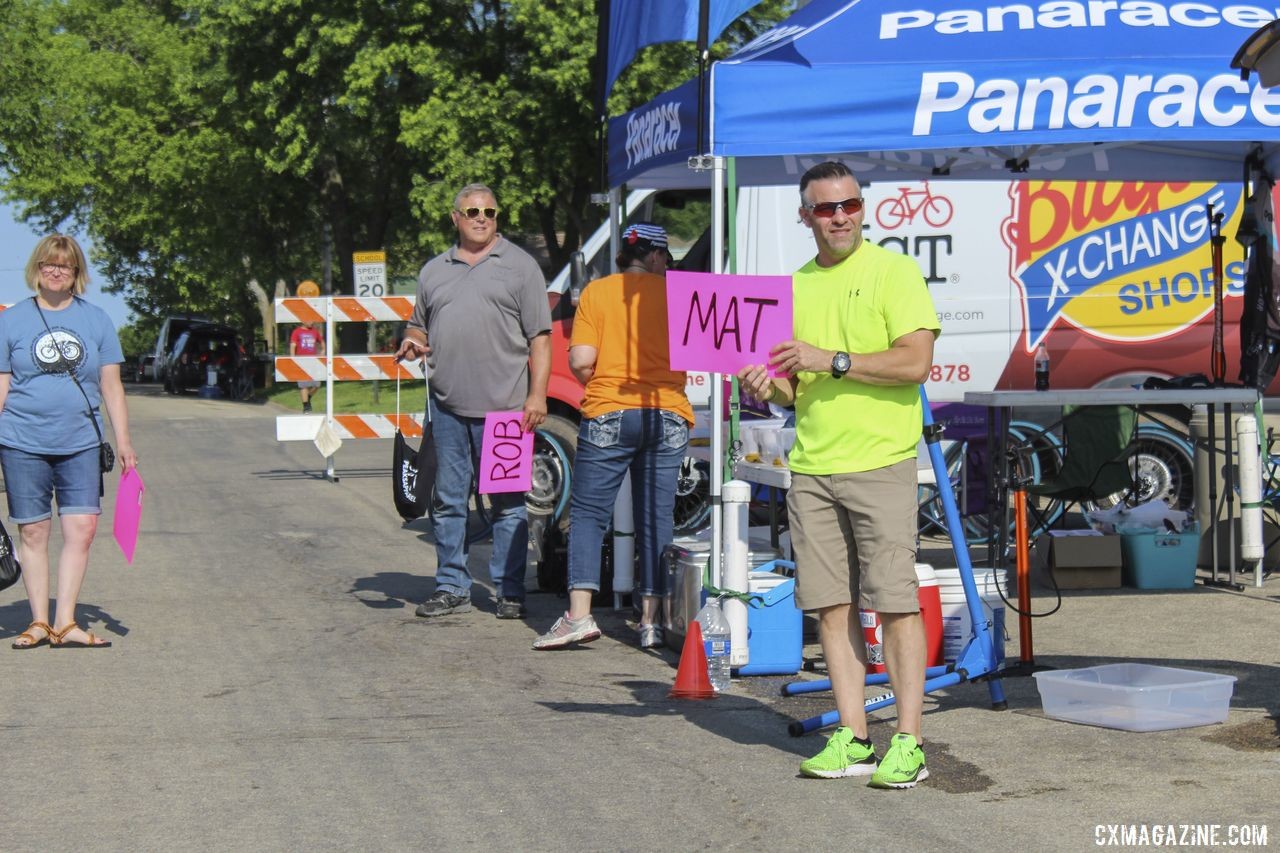
Pink signs were an addition for the team this year. 2019 Dirty Kanza 200, Panaracer / Factor p/b Bicycle X-Change Checkpoint 1. © Z. Schuster / Cyclocross Magazine
That was the plan, but as Cummings mentioned, you know what they say about the best-laid plans. Thanks to the distance to the first checkpoint and some extra gnarly sections of gravel, the lead group at the head of the DK200 race was smaller and less coherent than in years past.
First through was not four teammates but one rider from the team. A past runner-up at DK, Sencenbaugh hit the first checkpoint with the group of 17 riders chasing after the early solo breakaway rider. His crewmate was Jane Sencenbaugh, who took a casual approach to setting up at the checkpoint in a camping chair adjacent to the team tent. Experience, it turns out, has its advantages.
Michael started the race without a hydration pack, so Jane helped him swap in a Camelbak and grab a bag with some food, while she stocked him up with fresh water bottles.
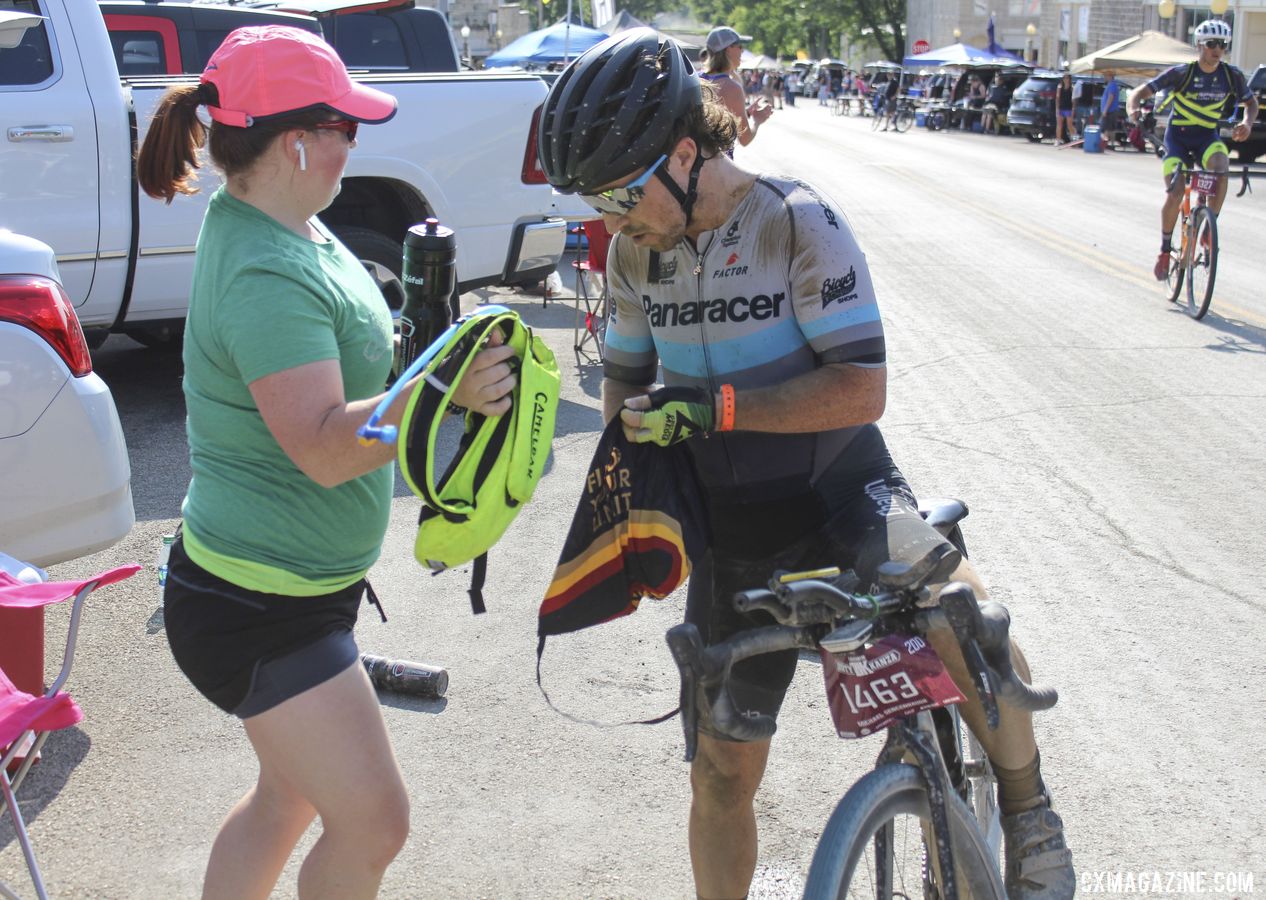
Jane Sencenbaugh helps Michael get a hydration pack and a new water bottle. 2019 Dirty Kanza 200, Panaracer / Factor p/b Bicycle X-Change Checkpoint 1. © Z. Schuster / Cyclocross Magazine
Calm and collected, Sencenbaugh was in and out in under a minute and back with the group he rolled in with.
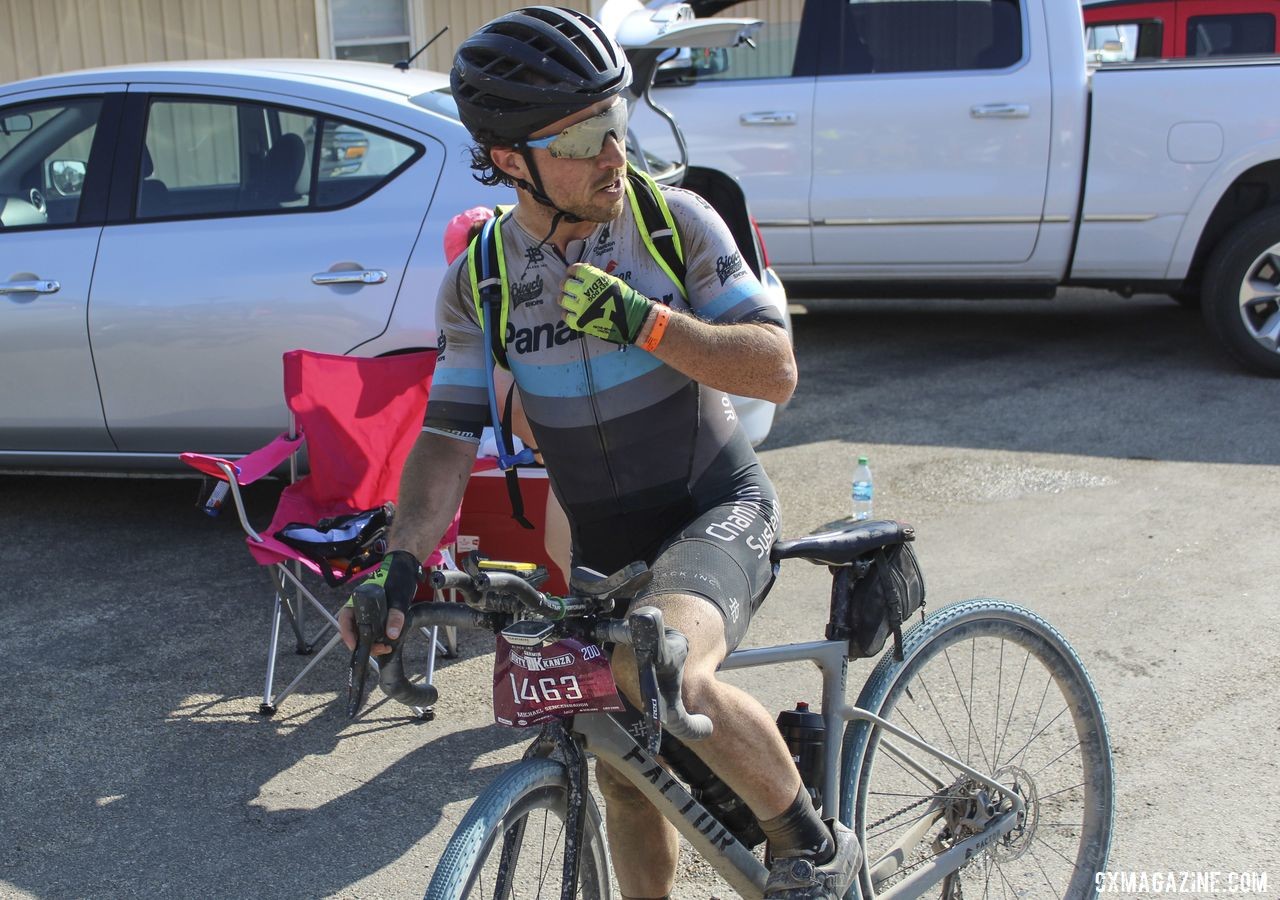
Michael Sencenbaugh had time to wait for his group after a quick Checkpoint stop. 2019 Dirty Kanza 200, Panaracer / Factor p/b Bicycle X-Change Checkpoint 1. © Z. Schuster / Cyclocross Magazine
Next through were two teammates, Borstelman and Moninger. This duo was among the riders the team expected to be the first through the first checkpoint, so they opted to roll through while grabbing feed bags. Moninger snagged his right at the exit.
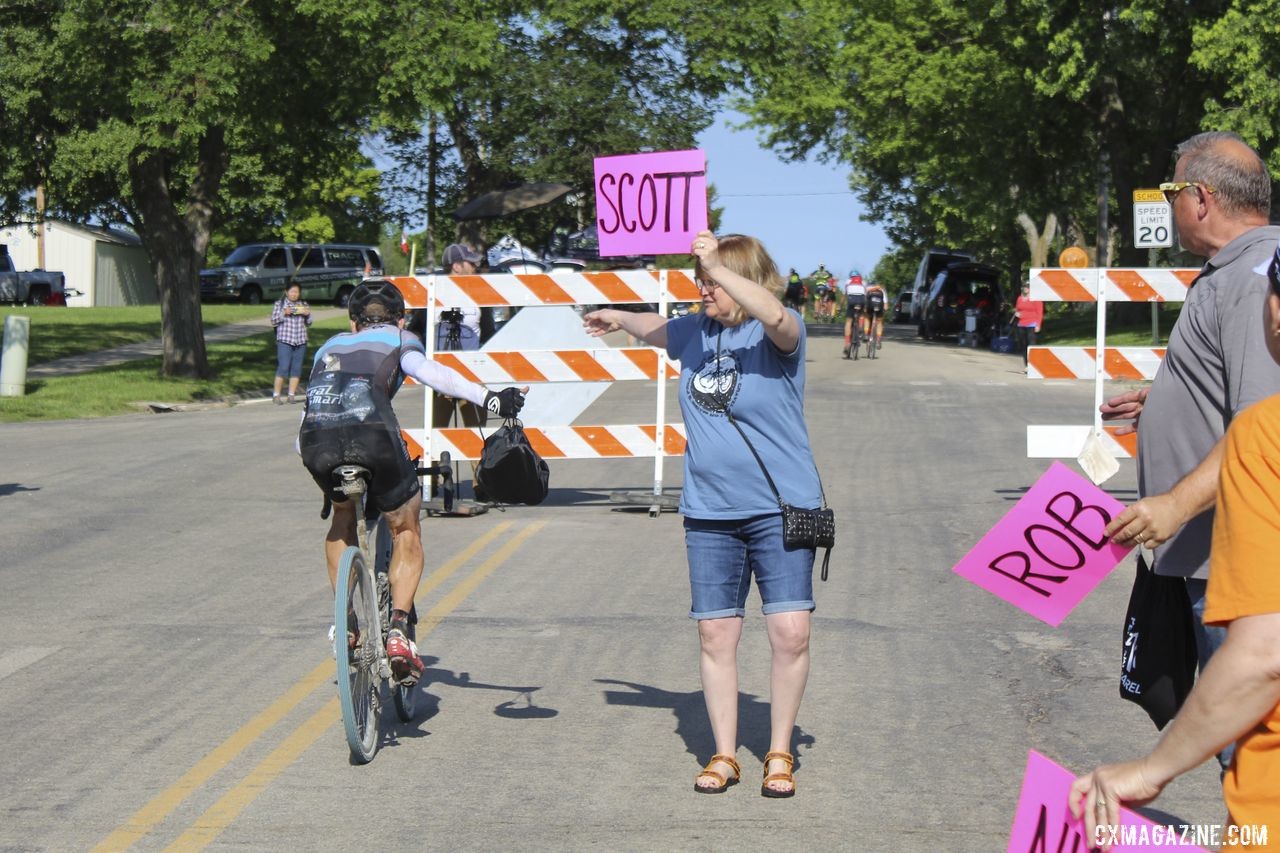
Scott Moninger grabs his feed bag and goes. 2019 Dirty Kanza 200, Panaracer / Factor p/b Bicycle X-Change Checkpoint 1. © Z. Schuster / Cyclocross Magazine
Four minutes behind them came Stephens, still recovering from his early flat. Takeshita’s husband Szokarski helped Stephens snag his bag while Mason was on sign duty. It was not an ideal start to the race for some of the team, but the smooth checkpoint exchanges helped them pick up a few lost seconds.
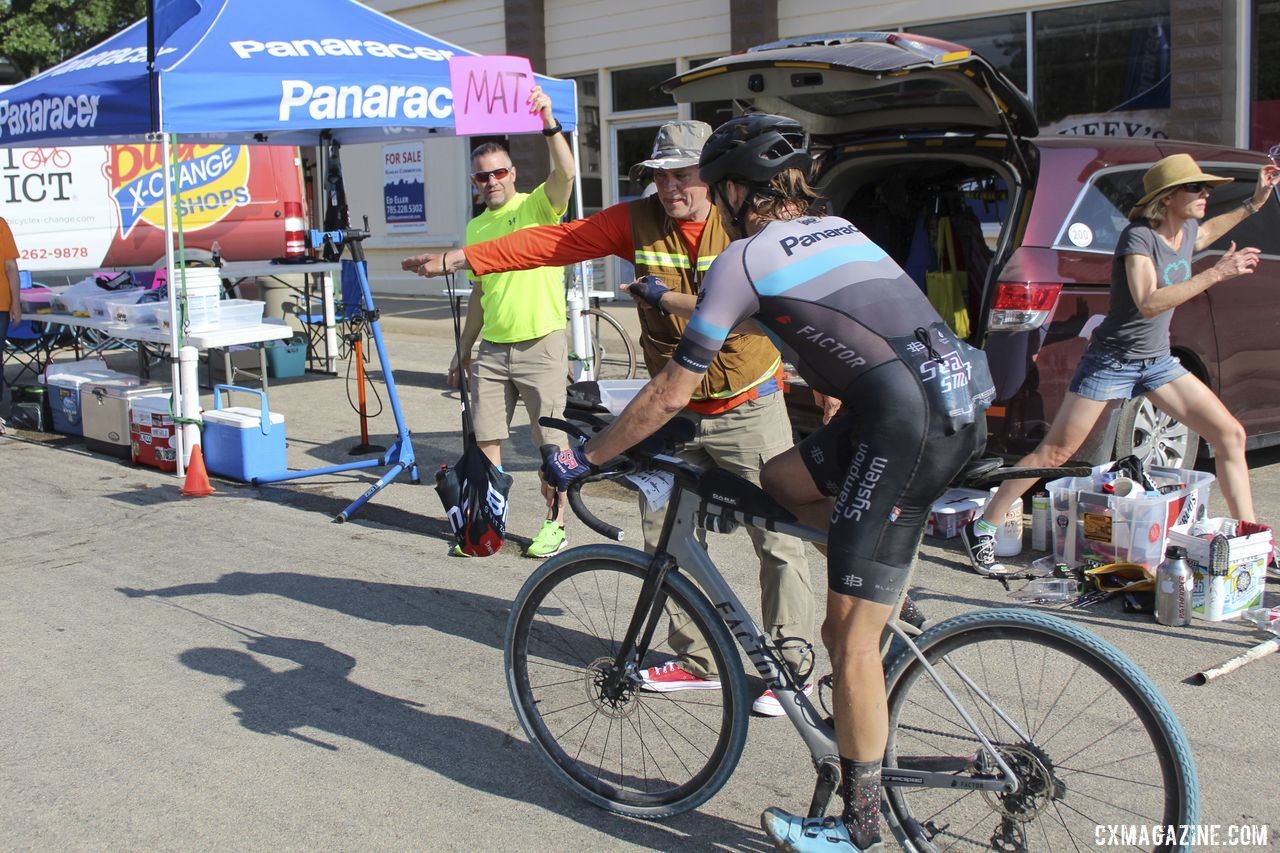
Dan Szokarski and Matt Mason helped Mat Stephens get his feed bag. 2019 Dirty Kanza 200, Panaracer / Factor p/b Bicycle X-Change Checkpoint 1. © Z. Schuster / Cyclocross Magazine
A minute behind that group, Bell was planning on taking his feed bag and running, but then called an audible to stop and spread the contents out for easier access. By 9:10 a.m. when Bell made the checkpoint, temperatures on the sunny, cloudless day were already starting to heat up, so he opted to use one of his fresh bottles as an impromptu cooler.
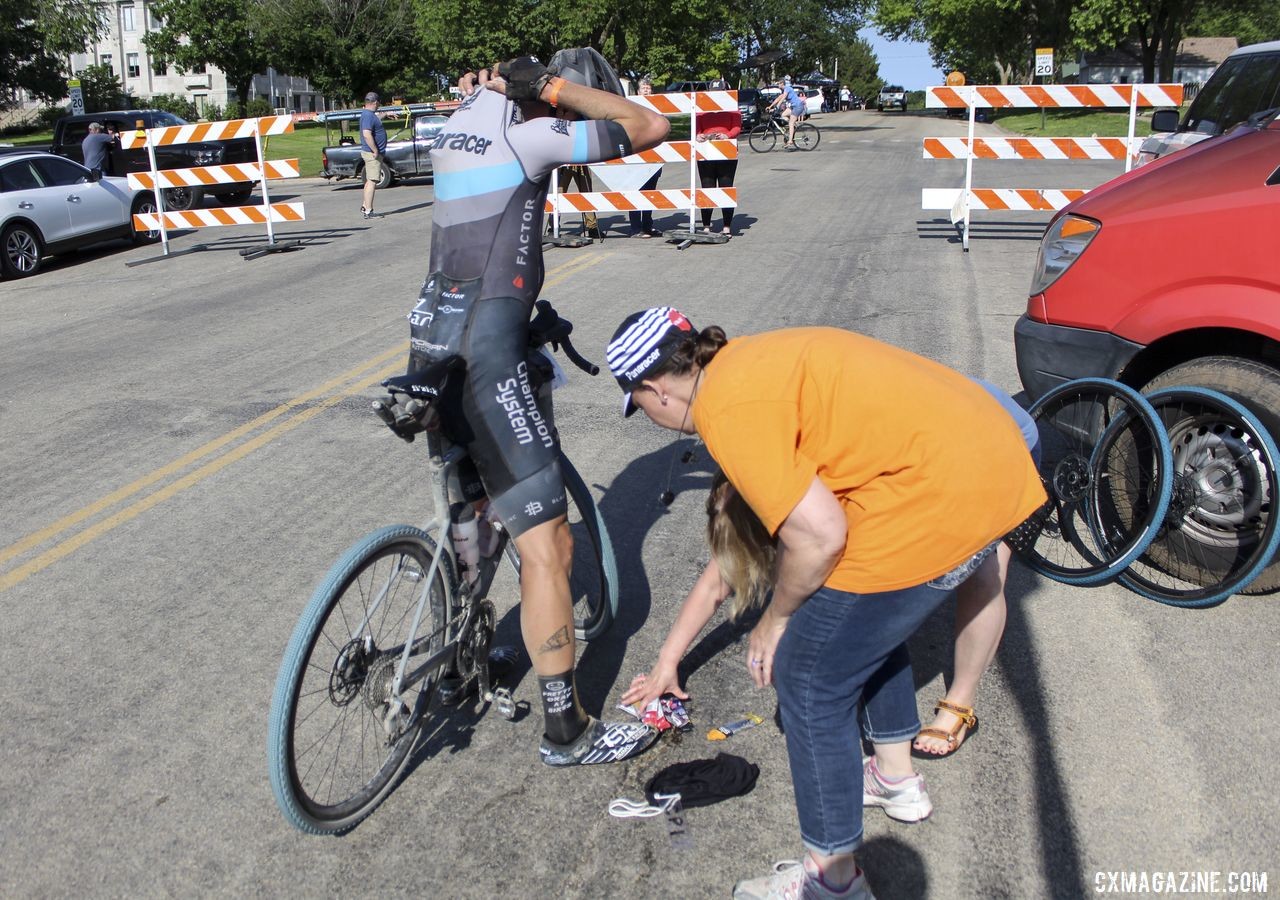
Bell opted to stop and take a few while cooling off. 2019 Dirty Kanza 200, Panaracer / Factor p/b Bicycle X-Change Checkpoint 1. © Z. Schuster / Cyclocross Magazine
Cummings also jumped in from her supervisory role to help Bell make sense of his nutrition and hydration spread across the ground while making sure he was properly packed as he started to roll away. The checkpoint shuffle was in full effect and it was still the early morning.
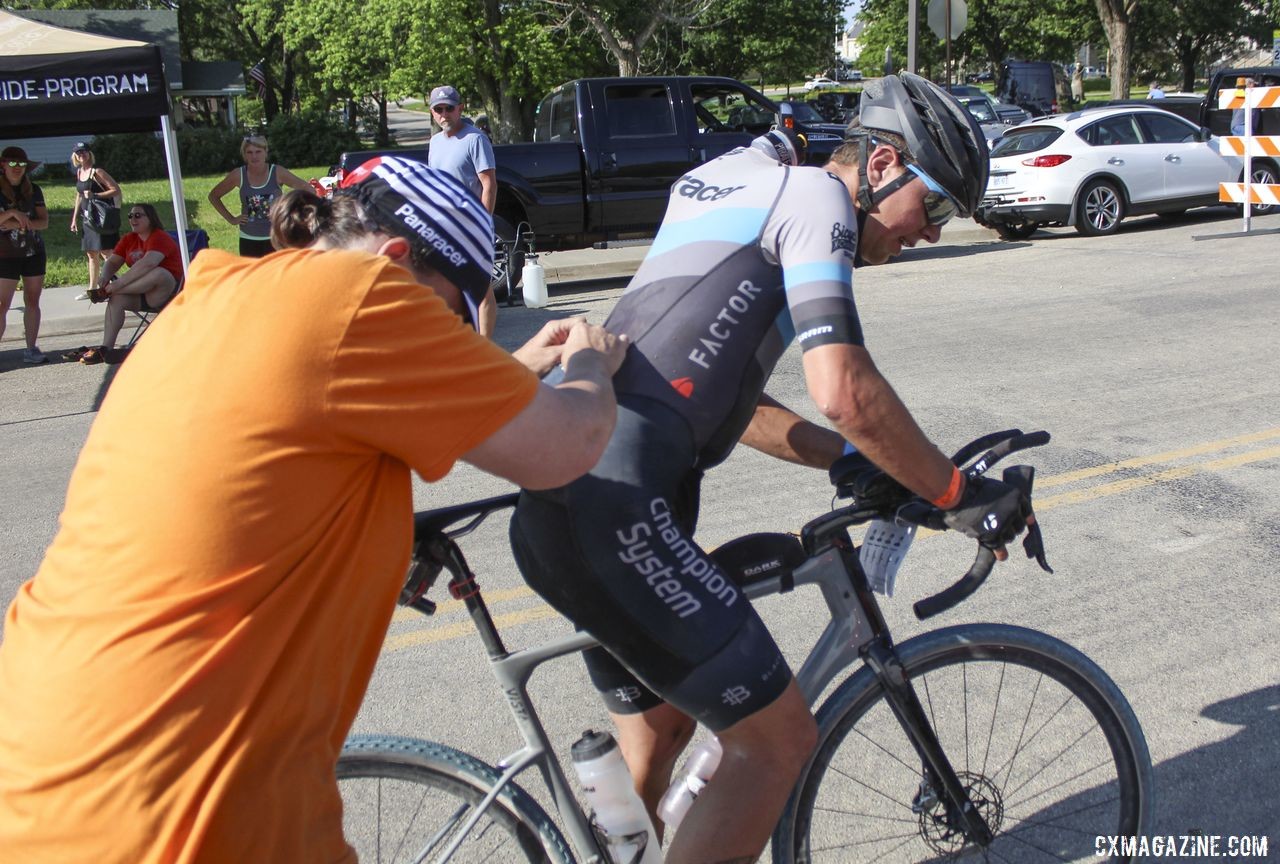
The Checkpoint Shuffle includes that one last thing you cannot forget. 2019 Dirty Kanza 200, Panaracer / Factor p/b Bicycle X-Change Checkpoint 1. © Z. Schuster / Cyclocross Magazine
Takeshita was the team’s first woman to come through Checkpoint 1. Entering the race with podium aspirations, Takeshita passed through Checkpoint 1 3 minutes behind then race leaders Amy Charity (DNA Pro Cycling Team), Olivia Dillon (Velocio) and Sarah Max (Argonaut).
Takeshita’s crew member was her husband Dan, who travels across the country with her during her many gravel adventures. Szokarski made himself easy enough to find that day, wearing a bright orange shirt with a reflective vest. Coupled with the bucket hat, not a bad way to be seen by Kae and less so by the oppressive Kansas sun.
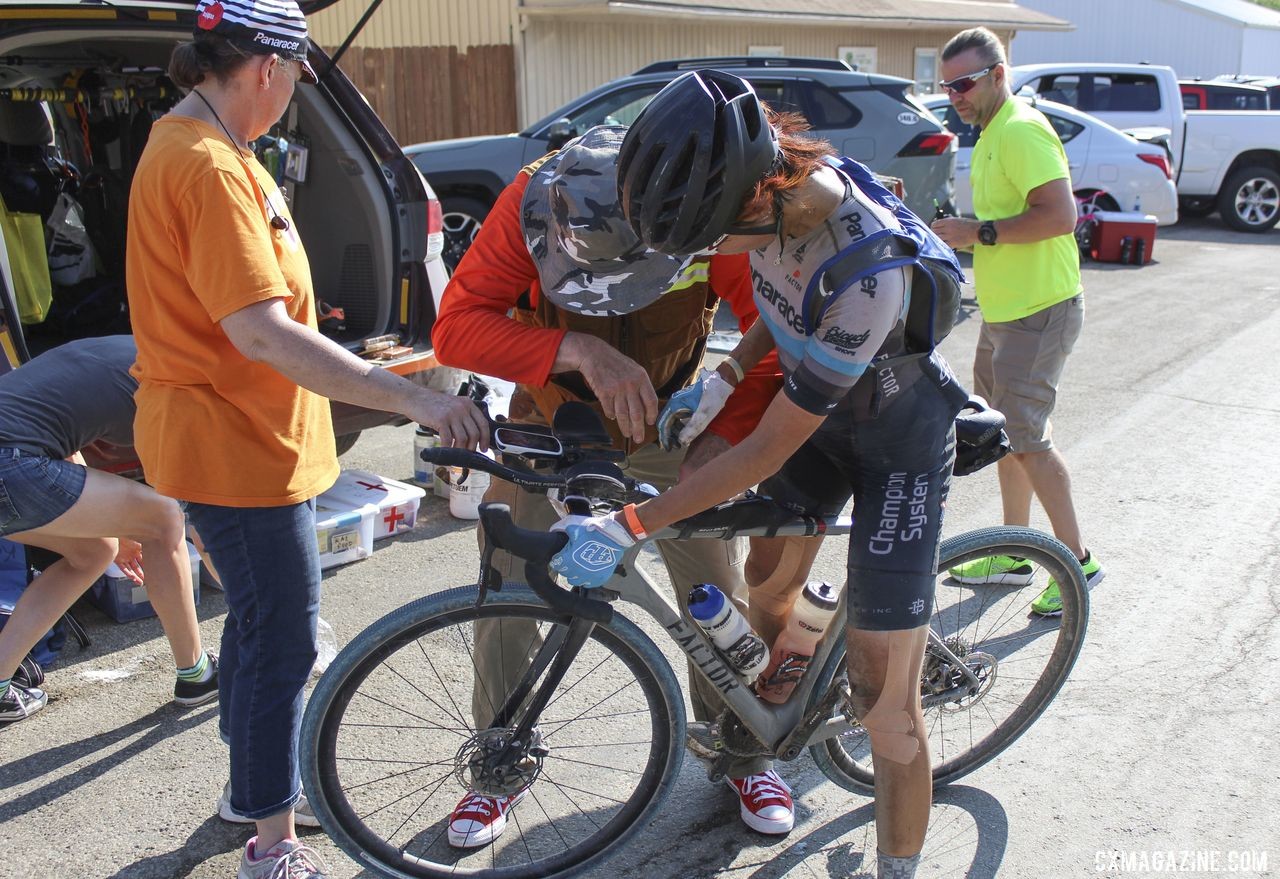
Dan Szokarski helps restock Takeshita’s top tube bag while Becky Cummings helps hold her bike. 2019 Dirty Kanza 200, Panaracer / Factor p/b Bicycle X-Change Checkpoint 1. © Z. Schuster / Cyclocross Magazine
Takeshita opted for a stop, with Szokarski restocking her gear while Mason helped re-lube her chain. Old gravel tars like Marchard and Bob Cummings on the team tend to like to fix their own equipment, but Mason was set to handle mechanic duties for others as needed throughout the day.
Szokarski loaded up new bottles and a new stash of food in Takeshita’s top tube bag, while Mason made sure things were running smoothly in her drivetrain. Once loaded and lubed, she was ready to go.
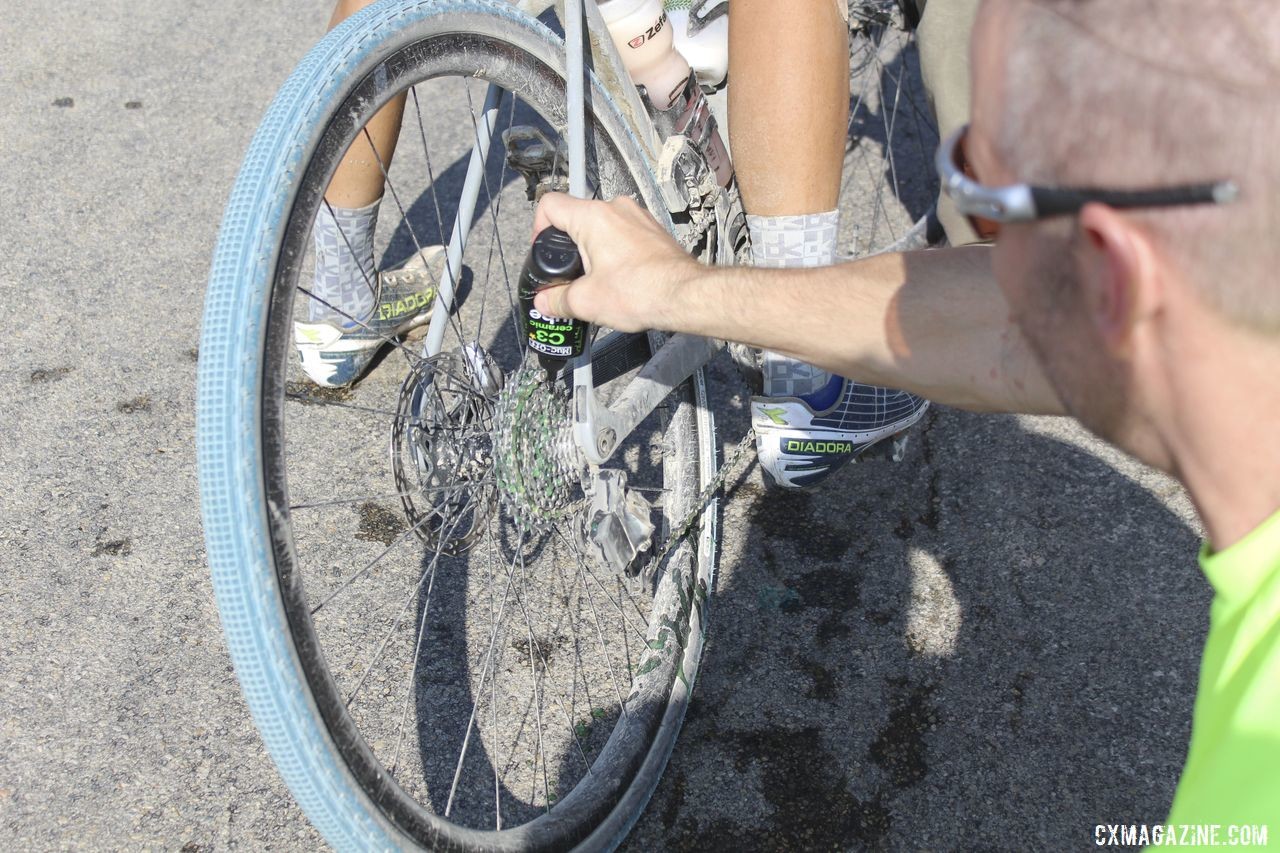
Matt Mason lubes Takeshita’s chain while she restocks on food and water. 2019 Dirty Kanza 200, Panaracer / Factor p/b Bicycle X-Change Checkpoint 1. © Z. Schuster / Cyclocross Magazine
I had to bounce to get back to chasing the race leaders, but the scene repeated itself in Alma for the rest of the team’s riders as they stopped at Checkpoint 1 and then again later in the afternoon at Checkpoint 2.
On to the Next
When I spoke with Cummings on Friday, she commented on the two-checkpoint setup versus the three-checkpoint setup the race used on the route the last few years. “I definitely like two checkpoints because it’s less driving around and one less time to break down and set up. I think it’s good. I think the riders probably won’t like it as much. For the pit, it’s definitely better.”
Another of the challenges with the three-stop course was being at one checkpoint for the team’s full roster of riders before heading to the next. Massive time gaps between riders and groups start to open up as the race nears its midpoint, so for a team with nine riders, that can mean up to an hour between its riders. Cummings recounted having to pack and run to the next town in a hurry in previous years.
Fortunately, this year, it was almost 90 miles of course distance from Checkpoint 1 in Alma to Checkpoint 2 in Council Grove, so the team had extra time. The team does have a contingency plan, knowing the Kanza gods can be quite unforgiving. “The Bicycle X-Change, our sponsoring bike shop, provided us with a van,” Cummings said. “Some of us drive our own vehicles, and we have a van driver. You don’t want to have all your eggs in one basket. We need at least some people to get to the next checkpoint.”
When a full day of Kanza gravel was done, it was a good day for the Panaracer / Factor p/b Bicycle X-Change team.
Takeshita led the way, tying her DK200 career best by finishing fourth in the Women’s race. Borstelmann led the Men’s squad, finishing 11th and Sencenbaugh was right behind him in 12th. Stephens also bounced back from his early mechanical to finish 15th.
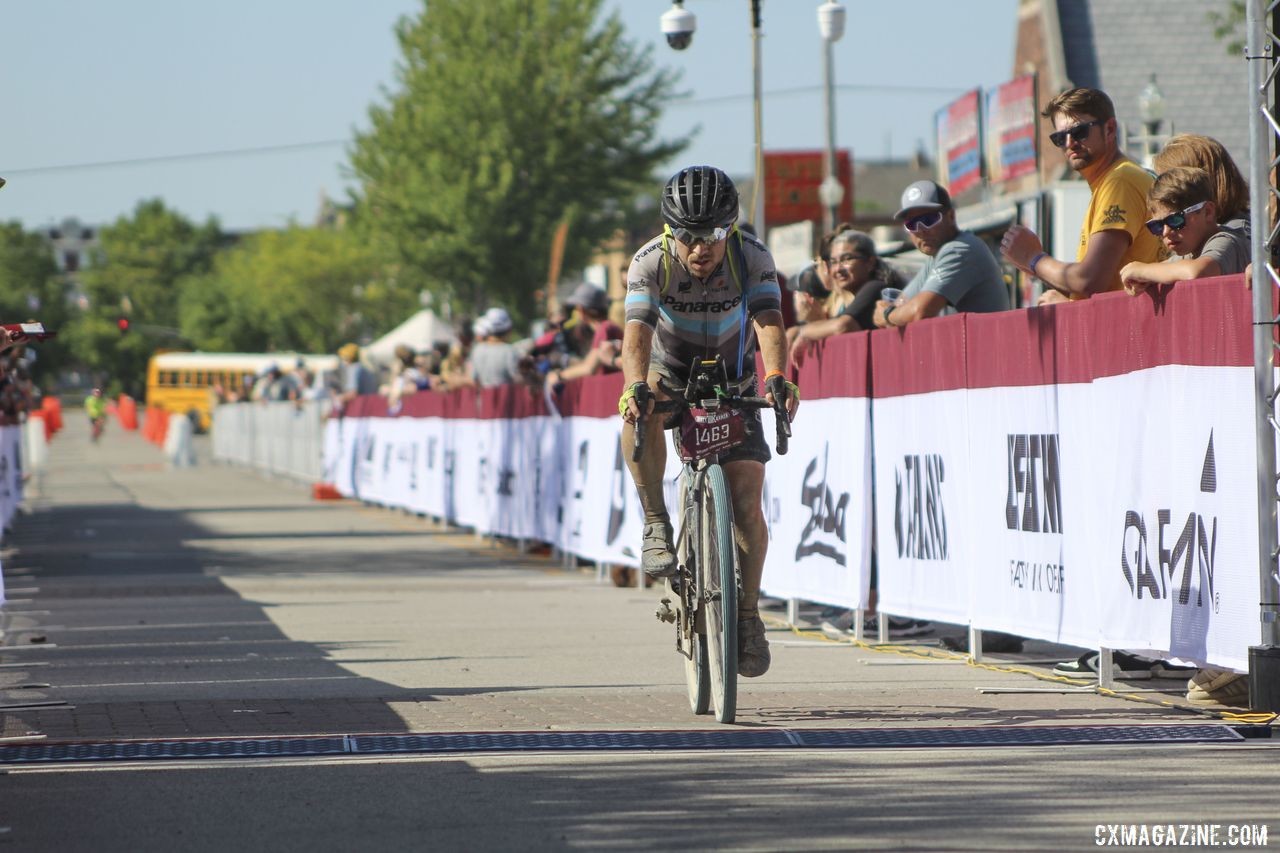
Sencenbaugh finished with a solid 12th-place result. 2019 Dirty Kanza 200, Panaracer / Factor p/b Bicycle X-Change Checkpoint 1. © Z. Schuster / Cyclocross Magazine
Though they play a small part in those results, the checkpoints are an important part of the Dirty Kanza 200 race, and if the past is a guide, there were be new things to learn from this year.
“You always think you’re so prepared, and every year, sometime you didn’t expect happens,” Cummings reflected.








